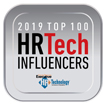Influence in HR technology comes from many places, takes many forms and continues to evolve over time. When the HRE/HR Tech Conference team met over the winter to work on this Influencers list, we knew it would be important to  consider all aspects of influence. Some have more of a direct and immediate effect on products, while others have a more subtle yet longer-term impact. It’s safe to say all, however, are having an important and noticeable impact on where HR technology has been, where it is today and, perhaps most importantly, where it is heading. And that, above all else, informed the decision-making that went into compiling this list, which presents those being recognized in alphabetical order. Click here to see the Top 100 HR Tech Influencers.
consider all aspects of influence. Some have more of a direct and immediate effect on products, while others have a more subtle yet longer-term impact. It’s safe to say all, however, are having an important and noticeable impact on where HR technology has been, where it is today and, perhaps most importantly, where it is heading. And that, above all else, informed the decision-making that went into compiling this list, which presents those being recognized in alphabetical order. Click here to see the Top 100 HR Tech Influencers.
–
 Lisa Sterling
Lisa Sterling
Chief People and Culture Officer
Ceridian
How can HR leaders best make the business case for HR technology investment?
Tailor your case to your audience. For a leadership team who is focused on the ROI predominantly, focus on how technology can reduce redundancies and costly errors, while increasing compliance. You can also focus on the redeployment of your people to more strategic output by reducing the administration and time associated with manual processes. Both of which lead to cost savings.
If your organization takes a people-centric approach, lead with the positive impacts to workplace culture. Implementing a mobile experience where employees can request earned wages on-demand, or get expedited approvals for schedule changes, typically leads to improved employee engagement and satisfaction levels. Ultimately, investing in HR technology is investing in your people.
What’s the single most dramatic shift you see happening in the HR tech space today?
The world of human capital management is undergoing a number of fundamental changes, however the rise of AI, machine learning and predictive analytics appears to be at the forefront. They are reshaping the way companies manage their workforces and make HR plans, and the greatest impact in the near term appears to be AI used to augment the actions of humans, rather than to replace them.
These technologies have also shown the potential to dramatically improve HR effectiveness, helping employees do their jobs easier and faster, helping managers make smarter decisions, and predicting and recommending future courses of action.
However, with all of this potential upside, AI involves large amounts of data, and if that data is inaccurate or tainted with bias, the AI’s output will reflect those shortcomings–this will be a key challenge for HR leaders to overcome moving forward.
What area of the HR function will be most impacted by emerging technologies, and why?
The employee experience. From a process and technology investment perspective, leaders need to elevate the employee experience so that it is instantaneous, personalized, integrated, and accessible. Delivering a winning employee experience means leveraging technology to provide employees an experience at work that is comparable to their experience as consumers. Providing a consumerized platform to employees is no longer a “nice to have”–it is considered table stakes, and this trend is expected to accelerate in the future.
—
 Laszlo Bock
Laszlo Bock
CEO
Humu
What’s the single most dramatic shift you see happening in the HR tech space today?
Culture has emerged as the biggest creator, and destroyer, of corporate value. Deutsche Bank, Purdue Pharma and Uber are just a few examples. Most companies have stories of failed “agile” transformations or HRIS systems that never delivered on their ROI promises. What’s emerging are better ways to not only measure what matters (hint: it’s not “engagement” or “favorability”) but also transform behavior and the business. At Humu we’ve seen as much as 10% to 15% improvements in productivity, 10% to 40% improvements in attrition, and even bigger leaps in inclusion through smarter measurement and targeted “nudges.” Solving culture at scale is the future of HR tech.
In acquiring and implementing new technologies, what’s the one or two most common mistakes HR organizations make?
HR organizations fall in love with flashy dials and displays. It’s fun to spin the dials on a dashboard and get “real time” data across your screen. But your intranet is not Facebook: the goal shouldn’t be maximize screen time. And the average manager is not going to have better insight than an expert team of HR people and scientists that have been exploring how best to drive performance for a decade or more. Instead, acquire products that are proven to drive the most change with the smallest investment of employee and HR time and intervention.
How is HR technology changing the way people work?
Employee monitoring has expanded far more than most people realize. Companies are mining all their employees’ activities: reading emails, tracking meeting activity, and even how people move around buildings. It’s legal, but most people would be surprised and creeped out to know that “big brother” is documenting every email, meeting, and bathroom break (regardless of whether “big brother” is a person or a machine). For me and my co-founders at Humu, there is a higher standard: a line between what’s appropriate and respectful, and what simply isn’t. Companies would do well to consider this before deploying any new HR technology.
—
 Brian Sommer
Brian Sommer
Founder and President
TechVentive Inc.
How is HR technology changing the way people work?
“HR groups have traditionally embraced technology that makes HR more productive and efficient. However, newer HR technologies (e.g., chatbots) may improve service levels and create a better employer/candidate experience. While those are great outcomes, there is a risk that new HR technology will make the person-to-person contact between HR and alumni, employees, jobseekers, etc. more and more scarce or impersonal. HR can’t be in-tune with the workforce if AI-tools are making a number of hiring, promotion and other decisions. HR can’t know what the culture looks like if new-tech shelters HR from people. Work and HR are changing, but will HR have the perspective to add value to the organization?
In acquiring and implementing new technologies, what’s the one or two most common mistakes HR organizations make?
HR teams rush to acquire new technology before fully assessing all of the new innovations out there. Until you do this, you cannot understand what is the art of the possible let alone ideate/develop what a truly reimagined HR process should look like. That lack of discovery almost always means a selection team will pick something that is only incrementally better than what they have today. Incremental solutions are NOT transformational.
The other pitfall occurs when selection teams go back to their old HR/ERP vendor (or implementer) expecting great things will come from them again. Sadly, old vendors often lack in innovation efforts and their †˜new’ solutions are often a freshened-up version of the old stuff. Seek true love elsewhere, folks!
What area of the HR function will be most impacted by emerging technologies, and why?
Believe it or not, the most impacted area will be HR itself. While it seems all HR pros have cursory knowledge about algorithms, machine learning, bots and more, I find it extremely rare to see HR departments actually contain people with deep skills in these. I’m not seeing HR people getting trained in these technologies nor are they hiring new HR people with these skills in any appreciable numbers. If HR departments don’t understand new tech, then they can’t implement it or use it well. And, if a company, for example, should ever get sued for the actions of its algorithms, who in HR can defend the company?
HR has to change/evolve if it is to even have a chance of successfully deploying these innovative technologies.
—
 John Sumser
John Sumser
Founder, Principal Author and Editor-in-Chief
HRExaminer
What area of the HR function will be most impacted by emerging technologies, and why?
HR is rapidly evolving from an artisanal discipline to a relatively quantitative science. While all aspects of decision making will soon have a predictive element, it’s the things we haven’t done before that are the most interesting. You might imagine that some HR Generalists will be replaced by HR Product Managers. The new HRPMs will be responsible for delivering frictionless insights and recommendations to supervisors and the rest of business leadership.
What’s the single most dramatic shift you see happening in the HR tech space today?
The rapid evolution of the discipline that spans all of HR Data has just begun. Expect to see an emphasis on data flows replace the current focus on workflows.
In acquiring and implementing new technologies, what’s the one or two most common mistakes HR organizations make?
The first mistake is buying without regard to a larger strategy. HR Departments have generally lost their ability to act strategically about HRTech. The second mistake is investing without having the underlying data cleaned and managed. The most important asset HR holds is its employee data. Any move forward should be rooted in the way it improves the overall data set.
—
 Chris Havrilla
Chris Havrilla
Vice President of HR Technology and Solution Provider Research
Bersin, Deloitte Consulting LLP
What area of the HR function will be most impacted by emerging technologies, and why?
The reality is every single HR function will be impacted significantly by emerging technologies. One challenge with adopting these technologies will be for HR teams to think less about their silos and more about the convergence necessary to tackle the forces, disruptions, and demands that will continue.
For instance, talent acquisition was traditionally tapped to solve attrition issues, instead of working on root causes. However, looking at some of the bigger issues that loom ahead †“ such as talent, skill, and population shortages †“ it is going to take a network of teams to address Talent Acquisition. HR will need to shift its thinking on several fronts, including viewing Talent Acquisition as “accessing talent,” learning & development as “learning in the flow of work/life,” and talent management as “addressing internal talent mobility challenges.” Even the convergence of HR and IT will become more and more prominent as we use technology to address productivity, experience, etc. †“ and as a catalyst to reinvent the HR function and its professionals.
To that end, while AI and Machine Learning will play a huge role as the emerging technologies driving all this reinvention of work, workforce, and workplace, I believe it’s emerging technologies such as virtual reality, augmented reality, and certainly blockchain that have an even greater potential to impact and revolutionize HR. There will be no room for simple, incremental change there — when those technologies gain traction, the impact will not be small.
What’s the single most dramatic shift you see happening in the HR tech space today?
One of the biggest challenges in HR tech today is the extraordinarily fast pace and breadth of change, innovation, and data insights †“ all occurring alongside increasing and varying demands from the labor force and increased competition for accessing talent. These factors are forcing companies to rethink their approach to their workforce and many are overwhelmed. One thing is clear: incremental change and status quo will no longer be acceptable; we are watching closely for the organizations that are taking action †“ and how they are going about it.
Deloitte found in our 2019 Global Human Capital Trends report that there are huge deltas between the awareness and pressure being felt by organizations, versus the actual readiness and action we are seeing across each of the trends. We see huge opportunities for organizations to jump ahead of the pack if they have a bent toward strategy development and are working with their partners to co-create solutions †“ thus allowing them to start doing the real work to tackle these challenges (productivity, experience, impact, performance, growth, etc.).
In acquiring and implementing new technologies, what’s the one or two most common mistakes HR organizations make?
Easy †“ among the most common mistakes that HR organizations make when implementing new technologies is lack of overall strategy development, and not doing “the work” to change how they work and how work is done in conjunction with bringing in technology. Technology is often looked at as a silver-bullet solution to problems and challenges, so implementation becomes the primary focus. As such, organizations find they have not made work easier or people more productive, they just added more work, steps, or complexities †“ and increased dissatisfaction and frustration. This type of outcome is a big reason why Deloitte has been creating a body of work around AI in HR, and developed our first High-Impact Technology Strategy study †“ to help companies and solution providers with resources and content to tackle these issues.



